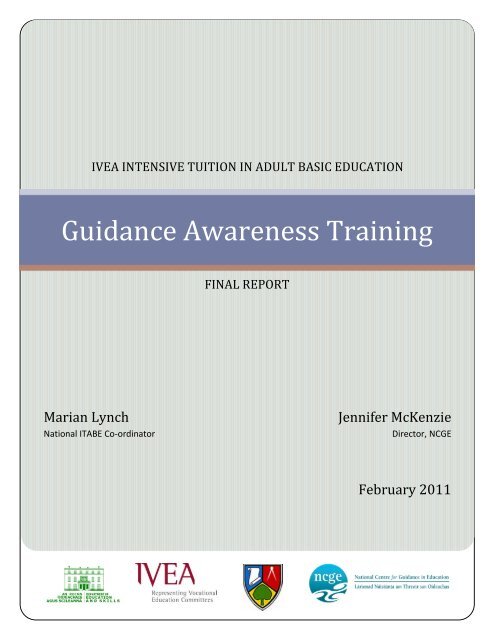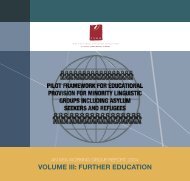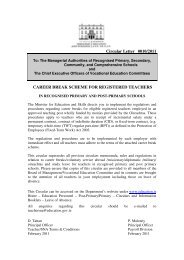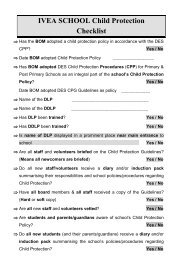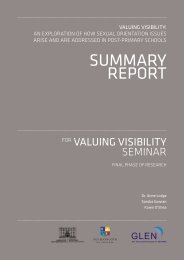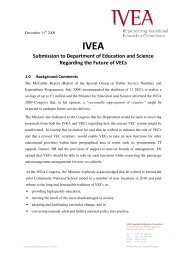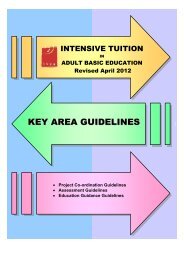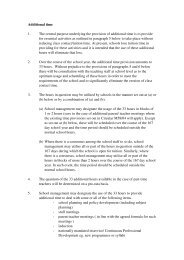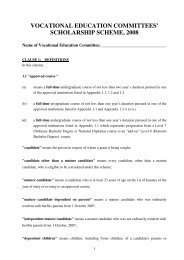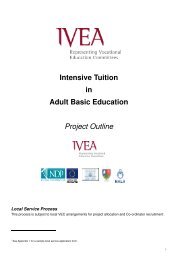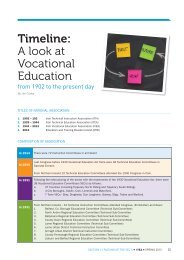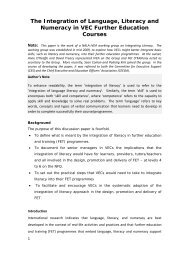Guidance Awareness Training - IVEA
Guidance Awareness Training - IVEA
Guidance Awareness Training - IVEA
You also want an ePaper? Increase the reach of your titles
YUMPU automatically turns print PDFs into web optimized ePapers that Google loves.
<strong>IVEA</strong> INTENSIVE TUITION IN ADULT BASIC EDUCATION<br />
<strong>Guidance</strong> <strong>Awareness</strong> <strong>Training</strong><br />
FINAL REPORT<br />
Marian Lynch<br />
National ITABE Co-ordinator<br />
Jennifer McKenzie<br />
Director, NCGE<br />
February 2011
TABLE OF CONTENTS<br />
Section 1 .......................................................................................................................................................6<br />
Introduction ...........................................................................................................................................................6<br />
Background and Context ...................................................................................................................................6<br />
ITABE Pilot Project .............................................................................................................................................6<br />
Key Area Guidelines in Adult Education <strong>Guidance</strong> ............................................................................................7<br />
Section 2 .......................................................................................................................................................9<br />
<strong>Guidance</strong> <strong>Awareness</strong> <strong>Training</strong> (GAT) .....................................................................................................................9<br />
GAT Working Group ...........................................................................................................................................9<br />
GAT Development and Delivery team ............................................................................................................ 10<br />
Aims of <strong>Guidance</strong> <strong>Awareness</strong> <strong>Training</strong> (GAT) ................................................................................................. 10<br />
GAT Delivery ................................................................................................................................................... 11<br />
Section 3 ..................................................................................................................................................... 12<br />
<strong>Guidance</strong> <strong>Awareness</strong> <strong>Training</strong> Day ..................................................................................................................... 12<br />
Presentations ................................................................................................................................................... 12<br />
Discussion Groups ........................................................................................................................................... 12<br />
Section 4 ..................................................................................................................................................... 14<br />
Feedback and Evaluation .................................................................................................................................... 14<br />
Attendance at GAT sessions ........................................................................................................................... 14<br />
<strong>Training</strong> Day Evaluation ................................................................................................................................... 14<br />
Follow up Evaluation ...................................................................................................................................... 14<br />
Summary of Evaluation ................................................................................................................................... 14<br />
Section 5 ..................................................................................................................................................... 16<br />
Conclusion .......................................................................................................................................................... 16<br />
Recommendations ...................................................................................................................................... 17<br />
Section 6 ..................................................................................................................................................... 19<br />
Appendices ......................................................................................................................................................... 19<br />
Appendix 1 ...................................................................................................................................................... 19<br />
Appendix 2 ...................................................................................................................................................... 22<br />
Appendix 3 ...................................................................................................................................................... 23<br />
Appendix 4 ...................................................................................................................................................... 29<br />
Appendix 5 ...................................................................................................................................................... 31<br />
1
Appendix 6 ...................................................................................................................................................... 36<br />
Appendix 7 ...................................................................................................................................................... 42<br />
2
Foreword<br />
The <strong>Guidance</strong> <strong>Awareness</strong> <strong>Training</strong> (GAT) programme was planned and delivered in 2008. The national<br />
co-ordinator of ITABE and the NCGE national co-ordinator of AEGI, worked together on all aspects of<br />
this programme with the support of the two national advisory groups and the relevant organisation<br />
representatives.<br />
We wish to acknowledge the support and commitment from all who have participated in the<br />
development and delivery of the <strong>Guidance</strong> <strong>Awareness</strong> <strong>Training</strong>, and the continued support of the<br />
Department of Education and Skills, and the national advisory groups of ITABE and AEGI.<br />
To reflect the success of ITABE and the on-going commitment from the Department of Education and<br />
Skills, the DES provided an additional representative to the ITABE advisory group from 2008. Due to<br />
the new structures within the National Centre for <strong>Guidance</strong> in Education, the NCGE-AEGI is now<br />
represented by the director of NCGE on the ITABE advisory group.<br />
Since the initial draft of this report in 2009, the Department of Education and Science has been<br />
restructured as the Department of Education and Skills. This final report on the <strong>Guidance</strong> <strong>Awareness</strong><br />
<strong>Training</strong> programme is being made available for publication in 2011.<br />
Marian Lynch<br />
National ITABE Co-ordinator<br />
Jennifer McKenzie<br />
Director, NCGE<br />
3
Glossary of<br />
Terms<br />
GAT<br />
ITABE<br />
LAT<br />
NALA<br />
ALS<br />
ALOA<br />
AEGI<br />
<strong>Guidance</strong> <strong>Awareness</strong> <strong>Training</strong><br />
Intensive Tuition in Adult Basic Education<br />
Literacy <strong>Awareness</strong> <strong>Training</strong><br />
National Adult Literacy Agency<br />
Adult Literacy Services<br />
Adult Literacy Organisers Association<br />
Adult Educational <strong>Guidance</strong> Initiative<br />
4
ITABE National<br />
Advisory Group<br />
(2010)<br />
Fiona Hartley<br />
John Stewart<br />
Mary Kett<br />
Jennifer McKenzie<br />
Mary Roche<br />
Justina Corcoran<br />
Marian Lynch<br />
Chair: Chief Executive Officer, Co. Wicklow VEC<br />
National Adult Literacy Co-ordinator, National<br />
Adult Literacy Agency (NALA)<br />
Further Education Co-ordinator, Department of<br />
Education and Science (DES)<br />
Director, National Centre for <strong>Guidance</strong> in<br />
Education (NCGE)<br />
Adult Literacy Organiser, Adult Literacy<br />
Organisers Association (ALOA)<br />
Assistant Principal Officer, Department of<br />
Education and Skills (DES)<br />
NationalITABE co-ordinator, <strong>IVEA</strong>, Co. Dublin<br />
VEC<br />
<strong>Guidance</strong><br />
<strong>Awareness</strong><br />
Working Group<br />
(2007-2008)<br />
Jennifer McKenzie<br />
Marian Lynch<br />
Eimear Brophy<br />
Deirdre Johnston<br />
Director, National Centre for <strong>Guidance</strong> in Education<br />
(NCGE)<br />
NationalITABE co-ordinator, <strong>IVEA</strong>, Co. Dublin<br />
VEC<br />
Adult Education Officer, Co. Limerick VEC, Adult<br />
Education Officers Association<br />
Adult Education <strong>Guidance</strong> Co-ordinator, Dun<br />
Laoghaire VEC, Adult Educational <strong>Guidance</strong><br />
Association of Ireland<br />
Frances Ward<br />
Adult Literacy Organiser, City of Dublin VEC,<br />
Adult Literacy Organisers Association<br />
AEGI/<strong>Guidance</strong><br />
<strong>Awareness</strong><br />
<strong>Training</strong><br />
Development<br />
and Delivery<br />
Team<br />
Mary Stokes<br />
Patrick Stewart<br />
Deirdre Johnston<br />
Barbara Ronayne<br />
Adult Educational <strong>Guidance</strong> Co-ordinator,<br />
City of Dublin VEC<br />
Adult Educational <strong>Guidance</strong> Co-ordinator,<br />
Co. Dublin VEC<br />
Adult Education <strong>Guidance</strong> Co-ordinator, Dun Laoghaire<br />
VEC, Adult Educational <strong>Guidance</strong> Association of Ireland<br />
Adult Education <strong>Guidance</strong> Counsellor, Co. Mayo VEC<br />
5
<strong>Guidance</strong> <strong>Awareness</strong> <strong>Training</strong> in Intensive Tuition in Adult Basic Education<br />
Final Report<br />
SECTION 1<br />
Introduction<br />
Background and Context<br />
In 2006, the Irish Vocational Education Association (<strong>IVEA</strong>) made a successful submission to the<br />
Department of Education & Science (DES) to develop intensive adult basic education initiatives within<br />
the Vocational Educational Committee Adult Literacy Services (ALS). The allocation of this funding led<br />
to the development of the Intensive Tuition in Adult Basic Education (ITABE) programme. The aim of<br />
ITABE was to provide intensive tuition to adults with basic literacy needs. ITABE offered participants<br />
the opportunity to access six hours intensive literacy tuition per week over a 14 week period as<br />
opposed to the average tuition provision of two hours per week. ITABE facilitated the opportunity to<br />
deliver themed literacy or the integration of literacy and numeracy allowing students to increase<br />
motivation as well as accelerated improvement of basic skills. A key element of ITABE included the<br />
involvement of the Adult Educational <strong>Guidance</strong> Service (AEGS).<br />
The ITABE programme is supported by a national advisory group comprising of representatives of the<br />
DES, <strong>IVEA</strong>, National Adult Literacy Agency (NALA), the <strong>IVEA</strong>/VEC Literacy Forum, the Adult Literacy<br />
Organisers Association (ALOA). The ITABE programme is co-ordinated by a national co-ordinator,<br />
based in and supported by County Dublin VEC. The National Centre for <strong>Guidance</strong> in Education (NCGE)<br />
was invited to participate on this advisory group as the agency with responsibility for the national coordination<br />
of the Adult Educational <strong>Guidance</strong> Initiative (AEGI) 1 .<br />
For Background to Key Area Guidelines - <strong>IVEA</strong> Intensive Tuition in Adult Basic Education<br />
Guidelines see Appendix 1<br />
ITABE Pilot Project<br />
In 2006, as part of the pilot programme, 180 ITABE projects were allocated to each of the 33 VECs. An<br />
evaluation was carried out at the end of the pilot programme, by the national ITABE co-ordinator<br />
which included all stakeholders – AEOs, ALOs, AEGS 2 Co-ordinators, tutors and students.<br />
1 AEGI refers to the DES Adult Educational <strong>Guidance</strong> Initiative which provides funding nationally to VECs/WIT to provide the<br />
local adult educational guidance service.<br />
2 AEGS refers to the Adult Education <strong>Guidance</strong> Service, which is the local guidance service of the AEGI<br />
6
Outcomes from the ITABE evaluation process identified the need for guidelines in three key areas of<br />
the project. The three key areas recommended were:<br />
1. project co-ordination<br />
‘In tandem with the provision of a Resource Worker for adult literacy services, clear guidelines<br />
indicated the role and responsibility of the project co-ordinator should be developed and<br />
adopted across the VEC sector.’<br />
2. assessment procedure<br />
‘Clear operating guidelines and training in the use of assessment materials must be a feature of<br />
future ITABE programmes.’<br />
3. education guidance<br />
‘To facilitate improved co-operation between the ALS and the AEGI clear guidelines to support<br />
AEGI involvement in ITABE programmes should be developed. These guidelines should be<br />
accompanied by the development of an awareness training programme through which staff<br />
members of both the ALS and AEGI can gain a greater understanding of the interdependency of<br />
the respective services and potential for future development.’<br />
ITABE Pilot Programme Evaluation Report, McCann 2006<br />
Following a successful application for additional ITABE funding to develop the guidelines and a further<br />
application process from the VECs, the national ITABE advisory group and the DES selected nine VEC’s<br />
each hosting an AEGI service, to develop and pilot the guidelines over the autumn term 2006.<br />
Resulting from this a Key Area Guidelines - <strong>IVEA</strong> Intensive Tuition in Adult Basic Education Guidelines<br />
(2007) document was produced and circulated to all the VECs.<br />
Key Area Guidelines in Adult Education <strong>Guidance</strong><br />
An important feature of ITABE is the co-operation between the ALS and the AEGI and the interaction of<br />
both services towards supporting the educational needs of the students. The key area guidelines in<br />
relation to adult education guidance and ITABE identified a process to put in place a structure to<br />
enhance the partnership between the two services – ALS and AEGS.<br />
While it was acknowledged that the ALS staff provided a level of front line guidance and information to<br />
learners, it was recognised that a more structured contribution from the AEGS from the early stages of<br />
the programme was necessary to encourage progression and also to reflect the criteria regarding ITABE<br />
applications and funding process.<br />
7
This process involved the delivery of Literacy <strong>Awareness</strong> <strong>Training</strong> (LAT) for the guidance services. The<br />
LAT was organised for all AEGS staff to gain a greater understanding of adult literacy issues, the local<br />
Adult Literacy Services (ALS) and adult literacy provision. This was co-ordinated by the national coordinator<br />
of AEGI in NCGE in consultation with the national ITABE co-ordinator. The LAT training was<br />
delivered by NALA and took place on a regional basis in 2007. The NCGE-AEGI evaluation of the LAT<br />
highlighted other specific areas which required further development which included:<br />
• The need for <strong>Guidance</strong> <strong>Awareness</strong> <strong>Training</strong> (GAT) for literacy staff.<br />
• An awareness and understanding of the various levels of guidance required by ITABE<br />
participants.<br />
• To clarify the role for guidance in responding to the needs of ITABE participants with special<br />
educational needs.<br />
The NCGE-AEGI evaluation further identified a lack of understanding by the ALS as to how the AEGS<br />
was being delivered within ITABE, including group and one to one guidance support. This need for<br />
further clarification on the role of the AEGI was noted in the ITABE Pilot Programme Evaluation Report<br />
(2006) and again by both services involved in developing the Key Area Guidelines - <strong>IVEA</strong> Intensive<br />
Tuition in Adult Basic Education Guidelines (2007). This initiated the necessity for <strong>Guidance</strong> <strong>Awareness</strong><br />
<strong>Training</strong> (GAT) for the ALS. In response to this, the AEGI and ITABE national advisory groups<br />
established a working group to develop and deliver a programme of <strong>Guidance</strong> <strong>Awareness</strong> <strong>Training</strong> to<br />
the ALOs and ITABE co-ordinators. The GAT working group consisted of members of both advisory<br />
groups and was co-ordinated by NCGE.<br />
For Information on and background to AEGI, see Appendix 2<br />
8
SECTION 2<br />
<strong>Guidance</strong> <strong>Awareness</strong> <strong>Training</strong> (GAT)<br />
GAT Working Group<br />
The NCGE, supported by the national ITABE advisory group invited the relevant associations to<br />
nominate a representative for the GAT working group. Members of this group included the NCGE<br />
national co-ordinator of AEGI, national ITABE co-ordinator, and representatives from the AEOA, AEGAI<br />
and ALOA. The meetings were convened and chaired by NCGE with members reporting to both<br />
advisory groups and their associations.<br />
The remit of the GAT working group was to:<br />
• Discuss and make recommendations for a <strong>Guidance</strong> <strong>Awareness</strong> <strong>Training</strong> programme for<br />
Literacy/ITABE staff.<br />
• Discuss the guidance needs of and make recommendations for special needs groups within<br />
ITABE.<br />
• Consider how the models developed for AEGI/ITABE integration may be of relevance to other<br />
adult education programmes.<br />
The first meeting of the working group was held in January 2008, in County Dublin VEC. In addition to<br />
the tasks agreed, it also reviewed the following;<br />
(i)<br />
(ii)<br />
(iii)<br />
(iv)<br />
In response to the key elements and expected outcomes of the training, the group outlined a<br />
work plan to address the aims of the group, commencing with the development of a<br />
programme for guidance awareness training for Adult Literacy Organisers (ALO) and ITABE coordinators.<br />
In addition to this, the group agreed to carry out a GAT evaluation and write up a<br />
final report. A review of the GAT programme would be carried out at a later date to ascertain<br />
the effectiveness of its implementation over a given period.<br />
The discussion in relation to the guidance needs of participants with special education needs<br />
concluded that additional information was required. The working group also acknowledged<br />
that this was being addressed by the national ITABE advisory group.<br />
In relation to the relevance of this model of integration for other adult education services, this<br />
would be reviewed following an evaluation of the GAT programme for Literacy/ITABE and<br />
recommendations made at a later stage.<br />
The delivery of the GAT programme was to recognise the importance of each service’s role in<br />
the integration of guidance into ITABE (ie. guidance, literacy and programme planning). While<br />
the guidance awareness training programme was aimed at adult literacy and ITABE staff, the<br />
working group however, identified that guidance awareness in isolation would not suffice, and<br />
that a more integrated approach would be more beneficial. Therefore, an invitation to attend<br />
9
and participate in GAT was extended to the AEGS guidance co-ordinators/counsellors and VEC<br />
adult education Officers. It was envisaged that this integrated approach would support the<br />
overall inclusion of the AEGS and ALS in the design and delivery of guidance provision as part of<br />
the planning process for ITABE programmes.<br />
GAT Development and Delivery team<br />
NCGE approached the AEGI services and VECs where examples of good practice of the integration of<br />
adult education guidance into ITABE were in operation. Four AEGS guidance co-ordinators and a<br />
guidance counsellor working closely with their local Adult Literacy Services were invited to become<br />
part of the GAT development and delivery team. The remit of this team was to reflect on the various<br />
methods of guidance delivery within AEGI and develop a draft guidance awareness programme. This<br />
programme content would include theory, policy and examples of good practice in guidance delivery.<br />
One member of this team was then appointed as the AEGAI representative to the GAT working group.<br />
As guidance awareness training was a new initiative for both the guidance and literacy staff, NCGE<br />
invited the course manager of the NUI Maynooth Adult <strong>Guidance</strong> and Counseling programme to<br />
become involved in the process. The course manager provided support and mentoring to the team<br />
involved in the development and delivery of the GAT programme.<br />
Aims of <strong>Guidance</strong> <strong>Awareness</strong> <strong>Training</strong> (GAT)<br />
The aim of the GAT programme was to provide an understanding of adult guidance, to clarify how<br />
adult educational guidance was delivered to participants, to build positive relationships between the<br />
services in the context of ITABE programmes.<br />
The training content would include:<br />
• presentations from both the AEGI national co-ordinator and ITABE national co-ordinator<br />
• input from AEGS and shared experiences of working within ITABE groups<br />
• an outline of the AEGI and its role in ITABE<br />
• small group discussions<br />
• discuss and agree a process for a more collaborated and integrated AEGS input into ITABE<br />
• explore and agree a process of referral between both organisations<br />
10
• introduce an AEGS and ITABE local area planning process<br />
The working group in consultation with both national advisory groups reviewed the draft content at all<br />
stages of development including design, planning and delivery. The working group made appropriate<br />
additions and amendments to ensure that the content was relevant and appropriate to Adult Literacy and<br />
ITABE. The final GAT programme content was approved by each representative organisation.<br />
GAT Delivery<br />
To facilitate optimum attendance the GAT programme was held regionally on four consecutive<br />
Wednesdays in October 2008. NCGE informed the CEOs in each of the VECs of the planned training.<br />
AEOs, ALOs, ITABE co-ordinator/core tutors and AEGS guidance co-ordinators were also invited to<br />
attend. In recognition of the different situation in the city of Waterford area, where AEGI REGSA is<br />
located in Waterford Institute of Technology (WIT), NCGE wrote to the CEO, AEO and ALO in city of<br />
Waterford VEC to invite the relevant staff to attend the GAT programme.<br />
11
SECTION 3<br />
<strong>Guidance</strong> <strong>Awareness</strong> <strong>Training</strong> Day<br />
The training session was opened by an AEO from a local VEC as previously agreed through the AEOA.<br />
This was followed by presentations from both national co-ordinators and AEGI guidance coordinators/counsellor<br />
leading to themed facilitated discussion groups as outlined below.<br />
Presentations:<br />
1. Background on ITABE and AEGI - ITABE national co-ordinator<br />
This presentation outlined the background to the development of ITABE, the AEGI involvement<br />
within the literacy service and the response by the national ITABE advisory group in supporting<br />
the <strong>Guidance</strong> <strong>Awareness</strong> <strong>Training</strong>.<br />
2. <strong>Guidance</strong> <strong>Awareness</strong> - Theory and Policy - AEGI national co-ordinator<br />
This presentation focused on adult guidance in an adult educational context, creating an<br />
understanding of the AEGI service, its target groups and the policies governing the AEGI.<br />
3. AEGS and ITABE <strong>Guidance</strong> Provision in Context - AEGS guidance co-ordinator/counsellor<br />
This presentation outlined how adult education guidance could be integrated into ITABE to<br />
compliment the service already being provided by the ALO and the ALS. This presentation also<br />
included examples of present practices and reflected on the experiences of the guidance coordinators/counsellors<br />
involved.<br />
4. Discussion Groups<br />
Themed discussion groups took place both in the morning and afternoon. The discussion groups<br />
were facilitated where possible by an AEO and included representatives from all the services<br />
attending (eg. AEO, ALO, AEGS, and local ITABE programme co-ordinators/core tutors).<br />
Discussion Groups<br />
Discussion Group 1: Sharing Your Story<br />
This focused on the sharing of information and examples of communication and networking in<br />
operation by the AEGS, the ALS and ITABE across the various VECs. Participants reflected on the<br />
information outlined as part of the presentations and were invited to explore new ways of enhancing<br />
the communication and integration of both services. The information shared in this discussion session<br />
was reported back to the main group and documented. The key observations were drawn on to<br />
stimulate and inform the follow up discussions in the afternoon session.<br />
12
Discussion Group 2: The AEGS/VEC Planning of ITABE Programmes<br />
Each local VEC area team ie. AEGS, ALO, AEO, ITABE programme co-ordinator/core tutor were invited<br />
to form discussion groups. As part of the training content, sample templates on programme planning,<br />
information exchange and referral procedure were provided.<br />
Discussions also reflected on the information shared in the previous session and participants were<br />
encouraged to consider how this information may enhance their own local practice. For many VECs,<br />
this provided the opportunity to formally discuss and plan a process of integrating guidance into the<br />
ITABE for their local VEC area.<br />
To further enable this process, a draft template local area plan was circulated to each team. This was<br />
to encourage discussion and explore methods which may be used to put in place a mechanism or<br />
structure to advance a partnership approach for the integration of adult education guidance into<br />
ITABE.<br />
Each VEC area team was invited to discuss, agree, document and sign off on their proposed local area<br />
plan.<br />
For those area teams where relevant representatives were not present (eg. AEO, ALO, and AEGS Coordinator)<br />
the staff members agreed to bring the template to their respective VECs for discussion and<br />
approval and to be signed off by the AEO/ VEC management. This local area plan was to be forwarded<br />
to the AEGI national co-ordinator to support and inform future training and evaluation.<br />
In the case of the WIT based REGSA, the city of Waterford VEC ALO attended the GAT programme<br />
along with the REGSA guidance co-ordinator. The area plan for this VEC was to be discussed locally.<br />
See Appendix 3<br />
13
SECTION 4<br />
Feedback and Evaluation<br />
Attendance at GAT sessions<br />
One hundred and sixty six participants attended the GAT programme as detailed below:<br />
29<br />
54<br />
34<br />
18<br />
31<br />
•Adult Education Officers<br />
•Adult Literacy Organisers<br />
•AEGI <strong>Guidance</strong> Co-ordinators<br />
•AEGI <strong>Guidance</strong> Counsellors<br />
•ITABE Co-ordinators and Tutors<br />
<strong>Training</strong> Day evaluation<br />
A verbal feedback and evaluation took place at each of the four GAT days co-facilitated by the two<br />
national co-ordinators. Plenary discussions provided opportunities for critical reflection and<br />
comments, which also recognised examples of good practice already in place such as:<br />
• AEGS input into the Initial Adult Literacy Volunteer Tutor <strong>Training</strong> Course<br />
• positive relationships between the services<br />
• importance of planning between ALS and AEGS regarding schedules, course content etc.<br />
• sharing of information and feedback about the ITABE group/individual participants through an<br />
agreed referral procedure between both services<br />
Follow up Evaluation<br />
In November, a follow up evaluation form was sent to all participants and these were returned to the<br />
national co-ordinators in December 2008.<br />
Summary of Evaluation<br />
• Forty nine evaluation forms were returned, providing a 29.5 % response rate.<br />
• Overall, the individual evaluation reports provided positive feedback on the <strong>Guidance</strong><br />
<strong>Awareness</strong> <strong>Training</strong> programme.<br />
• The presentations were considered to be good/very good/excellent by 96% of respondents.<br />
• The group discussions were considered to be useful / very useful by the majority of participants,<br />
with only 10% and 12% respectively reporting that the two group discussions were ‘Not useful’<br />
• The sample templates for sharing of information, and referral procedures were found to be<br />
useful by 88% of respondents.<br />
14
The GAT programme had provided an opportunity for ALS and AEGS staff to focus specifically on<br />
working in partnership for ITABE and to share their experiences. For some, this was the first occasion<br />
that various representatives from their own individual VEC had the opportunity to work together as a<br />
team. Several respondents provided very positive evaluation on the team planning session and felt<br />
that the discussions on local area plan offered an effective structure on which to base further<br />
ITABE/AEGS planning meetings.<br />
Feedback indicated discrepancies in guidance support ranging from one hour per week per group to<br />
three hours per week per group. Further highlighted was the lack of AEGS provision in some areas.<br />
Both verbal and written evaluations identified the need for further clarification on the ‘appropriate’<br />
number of hours of guidance provision to be allocated to ITABE, either through one to one or group<br />
guidance sessions.<br />
For detailed statistics of Feedback and Evaluation Results, please see the following:<br />
Appendix 4: Results from the Evaluation Form sent out in November 2008<br />
Appendix 5: ITABE / AEGI Combined feedback<br />
Appendix 6: ITABE Feedback<br />
Appendix 7: AEGI Feedback<br />
Appendix 8: Additional comments<br />
15
SECTION 5<br />
Conclusion<br />
The <strong>Guidance</strong> <strong>Awareness</strong> <strong>Training</strong> programme was successfully developed and delivered with national<br />
regional and local participation.<br />
The GAT programme presented the theoretical basis of adult guidance and a sample framework for a<br />
partnership approach to support the integration of adult education guidance provision into ITABE.<br />
While many ALS and AEGS already worked closely together, the GAT programme provided an<br />
opportunity to focus purely on ITABE and the planning process necessary to ensure a clear<br />
understanding of how both services could work together in providing guidance within adult basic<br />
education programmes.<br />
The training sessions offered those attending the opportunity to gain a greater understanding of the<br />
types of networking taking place within other areas of the country between both services. It also<br />
offered examples of good practice on the integration of guidance in operation in a number of VECs. In<br />
addition to this, it offered opportunities to both the ALS and the AEGS to improve co-operation and<br />
gain a greater understanding of their respective services.<br />
The GAT programme further identified that the integration of appropriate guidance into the ITABE<br />
programme depended on the requirements of each individual ITABE group and may differ depending<br />
on the level of guidance service available. The support of the Adult Education Officers and VEC<br />
management has been a key element in the success of this integrated approach.<br />
16
RECOMMENDATIONS<br />
A planning process between ALS and AEGS, based on the key area guidelines should be developed<br />
locally to include:<br />
• discussion and consultation between ALS and AEGS on local guidance needs<br />
• AEGS input into tutor training to create and ensure guidance awareness for literacy staff<br />
involved in the provision of ITABE programme<br />
• sharing of information about the needs of the ITABE group prior to guidance provision<br />
• agreed standard referral and feedback system between both services<br />
• agreed scheduling of the group and one to one guidance sessions<br />
• carry out an annual review to reflect on-going practice and provision as identified by the ALS<br />
and the AEGS for the ITABE participants<br />
The provision and delivery of the guidance programme to ITABE should be agreed as part of the Local<br />
Area Plan between AEGS and ITABE. The identified needs of the participants will inform the number of<br />
hours for guidance delivery to each group<br />
A further interim evaluation is to be conducted at a later date. It is expected that this evaluation will<br />
provide each Adult Literacy Service and Adult Educational <strong>Guidance</strong> Service an opportunity to review<br />
and reflect on the ITABE/AEGS planning process - to review local area plans, sharing of information,<br />
referral systems and progression routes etc.<br />
The process employed in the development of this guidance awareness training for ITABE, could be<br />
used as a model for the integration of guidance across other adult education programmes through:<br />
• decisions and support at national and management level<br />
• national representative working subgroup<br />
• consultation and discussion involving all key staff<br />
• an integrated approach which recognises the importance of each service within the wider team<br />
in the provision of guidance to adult learners<br />
• providing guidance awareness training programme such as GAT to the relevant staff/tutors,<br />
followed by facilitated group discussions with local adult education and guidance staff<br />
17
• development of a local area plan between the adult education service and the AEGS to include<br />
scheduling of group and one to one provision, referral system, follow-up supports and<br />
progression options<br />
18
SECTION 6<br />
Appendices<br />
Appendix 1<br />
Intensive Tuition of Adult Basic Education (ITABE)<br />
Background<br />
Late in 2005 the Department of Education & Science (DES), in response to the high percentage of adult<br />
population experience poor basic skills highlighted in the OECD International Adult Literacy Survey<br />
(2005), invited relevant organisations to make an application to develop and deliver a national<br />
programme aimed at providing intensive adult basic education tuition. County Dublin VEC drafted a<br />
submission in co-operation with the VEC Literacy Forum which formed the basis for an application<br />
made by the <strong>IVEA</strong> on behalf of the VEC sector. This application proved to be successful and the DES<br />
agreed to invest €1 million in the design, delivery, co-ordination and evaluation of the national<br />
Intensive Tuition in Adult Basic Education (ITABE) pilot programme in 2006.<br />
The aim of ITABE is to provide participants, in groups of 6–8 students, with an opportunity to access six<br />
hours of ABE tuition per week over a 14 week period as opposed to the average tuition provision of<br />
two hours per week. Research in the UK has shown that 550 hours of tuition is required to improve<br />
literacy skills to a functional level and students could potentially achieve a level of independence in a<br />
shorter timeframe through extended intensive tuition (Moser Report 1999). ITABE facilitated the<br />
opportunity to deliver themed literacy or the integration of literacy and numeracy allowing students to<br />
increase motivation as well as accelerated improvement in basic skills.<br />
A specific literacy assessment tool, linked to the National Framework of Qualification levels, was<br />
developed to assist in the development of a curriculum and to measure progress made over the period<br />
of the pilot project.<br />
Management and Co-ordination of ITABE<br />
The ITABE programme is an <strong>IVEA</strong> led project and co-ordinated nationally by County Dublin VEC. It is<br />
supported by an advisory group comprising representatives of the Department of Education & Science,<br />
the Irish Vocational Education Association, the VEC Literacy Forum, the National Adult Literacy Agency,<br />
Adult Literacy Organisers Association and the National Centre for <strong>Guidance</strong> in Education.<br />
Overall monitoring and support of the project is provided by the national advisory group. Monitoring<br />
the implementation of the national project, liaising with, and supporting VECs on an on-going basis are<br />
carried out by the national ITABE co-ordinator, guided by the national advisory group.<br />
19
Aims and Objectives of ITABE<br />
• To provide adults with literacy/numeracy difficulties access to intensive tuition for a minimum<br />
of six hours tuition per week over a 14 week period.<br />
• To provide the opportunity for demonstrable improvement in literacy/ numeracy skills.<br />
• To provide tuition within the context of the individual student’s needs and the level of basic<br />
skills required to function within the home, community and workplace.<br />
• To deliver the tuition programme within appropriate models of good practice.<br />
• To provide an opportunity to achieve accreditation.<br />
• To include appropriate levels of engagement with the Adult Education <strong>Guidance</strong> Service.<br />
Criteria for ITABE funding<br />
• Participants to be 18 years of age or older and not attending full-time second level education.<br />
• Participants to have skills lower than FETAC Level 3.<br />
• The ITABE assessment to be carried out upon entry into the 14 week programme and after the<br />
programme is completed.<br />
• Appropriate levels of engagement by the Adult Education <strong>Guidance</strong> Service.<br />
• The majority of tuition hours to be allocated to literacy/numeracy.<br />
• Curriculum areas are: Communications (incl. numeracy), learning-to-learn and introduction to<br />
IT.<br />
• ITABE projects may not be used to deliver ESOL.<br />
• Each group to comprise of 6 - 8 participants.<br />
• Each project has an allocation of 84 tuition hours.<br />
• Accreditation options to be made available where appropriate.<br />
Key Area Guidelines - <strong>IVEA</strong> Intensive Tuition in Adult Basic Education Guidelines (2006)<br />
As part of the evaluation process for the ITABE Pilot Project the need for guidelines in a number of key<br />
areas was identified. The ITABE national advisory group made a recommendation to the Department<br />
of Education & Science to develop these guidelines using the remaining funds from the original pilot<br />
20
project and a structure to carry out this work was agreed in August 2006. Nine VECs were selected to<br />
develop and pilot the guidelines over the autumn term 2006.<br />
As the involvement of the Adult Education <strong>Guidance</strong> Initiative (AEGI) is key to the planning of ITABE<br />
projects, and while in some VECs this was working very well, it was identified there was a greater need<br />
for co-operation between the Adult Literacy Service (ALS) and the AEGI. The purpose of the education<br />
guidance guidelines is to place a structure on the process of interaction between the two services. One<br />
of the recommendations outlined in the document recognised the need for Literacy <strong>Awareness</strong><br />
<strong>Training</strong> (LAT) and <strong>Guidance</strong> <strong>Awareness</strong> <strong>Training</strong> (GAT) for key staff working with ITABE.<br />
In 2007, the national advisory group advised the ITABE co-ordinator to initiate the recommendations in<br />
relation to the awareness training. NCGE in consultation and collaboration with the national ITABE coordinator,<br />
commissioned NALA to deliver LAT to the staff of the Adult Education <strong>Guidance</strong> Services<br />
nationally. The ITABE evaluation and the NCGE-AEGI evaluation of the LAT programme both<br />
recommended (i) the development of guidance awareness training for literacy staff and (ii) support for<br />
the co-operation and integration of both services.<br />
21
Appendix 2<br />
National Centre for <strong>Guidance</strong> in Education (NCGE)<br />
The National Centre for <strong>Guidance</strong> in Education (NCGE) is an agency of the Department of Education<br />
and Skills. Its main role is to support and develop guidance practice in all areas of education and to<br />
inform the policy of the Department in the field of guidance. On behalf of the DES, NCGE co-ordinates<br />
the development of the AEGI through monitoring, reporting activities, service evaluation visits,<br />
technical support, and in-service continuous professional development for AEGI staff. NCGE convenes<br />
and chairs the AEGI advisory group on behalf of the DES. The National <strong>Guidance</strong> Forum (2007)<br />
definition of guidance clarifies that guidance does not merely focus on progression up through the<br />
education system, but also allows the individual to consider their life-wide opportunities.<br />
‘<strong>Guidance</strong> facilitates people throughout their lives to manage their own educational, training,<br />
occupational, personal, social and life choices so that they reach their full potential and contribute to<br />
the development of a better society’<br />
<strong>Guidance</strong> for Life: An Integrated Framework for Lifelong <strong>Guidance</strong> in Ireland (2007)<br />
The DES ‘Learning for Life’ White paper on Adult Education (2000) outlined that guidance involves a<br />
range of activities to help the individual to make these choices. Group guidance and one to one<br />
guidance sessions with a qualified guidance counsellor provide the adult learner with the opportunity<br />
to consider all of their options, not just within the education system but in all aspects of their lives.<br />
This is particularly appropriate in a Literacy/ITABE context, where adults are focusing on the<br />
development of literacy and numeracy skills and FETAC Levels 1-3. Recognition of prior learning (RPL),<br />
motivation, educational and vocational experiences/hopes, decision making, personal goals,<br />
information and advice on the adult education system and the National Framework of Qualifications<br />
(NFQ) are just some of the areas where guidance supports the individual in their lifelong learning<br />
journey.<br />
Adult Educational <strong>Guidance</strong> Initiative (AEGI)<br />
The AEGI is a DES funded initiative which provides quality educational guidance services for adults and<br />
consists of 40 Adult Educational <strong>Guidance</strong> Services (AEGS) nationally based within the VECs and<br />
Waterford Institute of Technology (WIT). The AEGI services provide adult guidance services to the<br />
target groups of VTOS, Adult Literacy, Community education (including BTEI) and former residents of<br />
designated institutions which includes impartial adult education information, one-to-one and group<br />
guidance which support people to make informed educational, career and life choices.<br />
The AEGI national advisory group was chaired by NCGE and included representatives of all the major<br />
stakeholders involved with the AEGI including the <strong>IVEA</strong>, AEOA and AEGAI.<br />
22
Appendix 3<br />
Sample templates<br />
AEGI and Adult Literacy Service<br />
One to One <strong>Guidance</strong> Feedback Form<br />
Name:<br />
Date of 1-1 meeting:<br />
Male <br />
Female <br />
General “progression plan” *:<br />
23
General “personal plan” *:<br />
24
AEGI and Adult Literacy Service<br />
Referral to ITABE Form<br />
Name:<br />
Date of referral:<br />
Age range: Male Female <br />
General “progression plan” *:<br />
General “personal plan” *:<br />
25
General educational and background/skills:<br />
26
Local Area Plan ( Sample)<br />
AEGS provision to ITABE<br />
Area: ____________________<br />
Agreed Local area Plan<br />
Adult Educational <strong>Guidance</strong> Service / Adult Literacy Service<br />
1. What works well for us<br />
______________________________________________________________________________<br />
______________________________________________________________________________<br />
_____________________<br />
2. What could we improve upon<br />
__________________________________________________________<br />
__________________________________________________________<br />
__________________________________________________________<br />
3. Referral procedure.<br />
______________________________________________________________________________<br />
______________________________________________________________________________<br />
_____________________<br />
4. Exchange of information<br />
______________________________________________________________________________<br />
______________________________________________________________________________<br />
_____________________<br />
5. <strong>Guidance</strong> awareness for initial tutor training<br />
_________________________________________________________________________________<br />
_________________________________________________________________________________<br />
________________________________________________________________________<br />
27
6. What could we implement now, based on the GAT today<br />
______________________________________________________________________________<br />
______________________________________________________________________________<br />
______________________________________________________________________________<br />
7. Document local plan<br />
eg. Date for planning meeting to address the above<br />
______________________________________________________________________________<br />
______________________________________________________________________________<br />
______________________________________________________________________________<br />
Signed AEGS: _________________________________<br />
Signed ALS : _________________________________<br />
Signed AEO : _________________________________<br />
28
Appendix 4<br />
Result from the Evaluation Form sent out in November 2008<br />
Participants were asked to rate:<br />
a) the GAT programme presentations on a scale of Poor / Good / Very good / Excellent<br />
b) the group discussions and sample templates on a scale of Not useful / Useful / Very useful.<br />
1 Background on ITABE and AEGI<br />
Poor 0%<br />
Good 14%<br />
Very Good 41%<br />
Excellent 45%<br />
2 <strong>Guidance</strong> <strong>Awareness</strong> – Theory and Policy<br />
Poor 4%<br />
Good 16%<br />
Very Good 43%<br />
Excellent 37%<br />
3 AEGI and ITABE <strong>Guidance</strong> provision in Context<br />
Poor 0%<br />
Good 14%<br />
Very Good 41%<br />
Excellent 45%<br />
4 Group Discussion 1 – Sharing your story in mixed groups<br />
Not Useful 12%<br />
Useful 29%<br />
Very Useful 57%<br />
No Response 2%<br />
5 Group Discussion 2 – Area Team Groups - ITABE/AEGI planning<br />
Not Useful 10%<br />
Useful 27%<br />
Very Useful 61%<br />
No response 2%<br />
6 Sample Template<br />
Not Useful 6%<br />
Useful 59%<br />
Very Useful 29%<br />
No response 6%<br />
SOME GENERAL COMMENTS<br />
The environment created was conducive to focused discussion on the development of guidance<br />
provision within ITABE and resulted in agreeing measures to develop further guidance activities within<br />
ITABE programmes.<br />
The planning exercise put a structure on the whole ITABE provision process and was such a valuable<br />
part of the day’s proceedings.<br />
29
Concrete exercise and produced a plan which we worked on and fine tuned<br />
Overall I found the training day excellent and it certainly helped our <strong>Guidance</strong> and Literacy Service to<br />
start working more in partnership for the future<br />
It was interesting in that this was the first time our teams got together to focus exclusively on guidance<br />
– and as a result we have decided to meet again in the New Year to develop a plan for guidance in<br />
general as well as specifically in relation to ITABE<br />
An integrated approach which recognises the importance of each role in a wider team in the provision<br />
of guidance to adult learners.<br />
Presentations on guidance theory and activities to the relevant staff/tutors, followed by facilitated<br />
group discussions with local guidance staff which focus on the appropriate integration of the theory<br />
into practice.<br />
30
Appendix 5<br />
<strong>Guidance</strong> <strong>Awareness</strong> <strong>Training</strong> 2008<br />
Programme Evaluation – ITABE Feedback<br />
Total number of evaluation forms received = 21<br />
ITABE Presentation<br />
SESSION 1 - PRESENTATIONS<br />
Rating<br />
No. of Responses<br />
Poor 0<br />
Good 2<br />
Very Good 9<br />
Excellent 10<br />
48%<br />
0%<br />
9%<br />
Poor<br />
Good<br />
Very Good<br />
43%<br />
Excellent<br />
<strong>Guidance</strong> <strong>Awareness</strong> Presentation<br />
Rating No of Responses<br />
Poor 0<br />
Good 3<br />
Very Good 10<br />
Excellent 8<br />
38%<br />
0%<br />
14%<br />
Poor<br />
Good<br />
Very Good<br />
Excellent<br />
48%<br />
31
AEGI and ITABE <strong>Guidance</strong> in Context<br />
Ratings<br />
No of Responses<br />
Poor 1<br />
Good 2<br />
Very Good 9<br />
Excellent 8<br />
0%<br />
9%<br />
Poor<br />
48%<br />
Good<br />
Very Good<br />
43%<br />
Excellent<br />
ADDITIONAL COMMENTS<br />
Anomalies between the experience of various AEG Counsellors (20 hours of guidance to an ITABE programme<br />
indicated in the presentation) and staffing levels added to confusion as to the appropriate level of guidance<br />
input.<br />
Group Discussion 1 – Sharing Your Story<br />
Ratings No of Responses<br />
Not Useful 6<br />
Useful 5<br />
Very Useful 10<br />
No Response 0<br />
0%<br />
28%<br />
Not Useful<br />
48%<br />
Useful<br />
Very Useful<br />
No Response<br />
24%<br />
32
ADDITIONAL COMMENTS<br />
Mostly indicated the lack of a cohesive approach to the purpose of guidance in ITABE and had the<br />
potential to create even deeper confusion without a clear indication from leadership as to the ‘right’<br />
approach and content.<br />
Interesting to hear how other counties avail and share expertise<br />
SESSION 2 - Group Discussion 2<br />
Area Team Groups - ITABE/AEGI Planning<br />
Ratings<br />
No of Responses<br />
Not Useful 4<br />
Useful 4<br />
Very Useful 13<br />
No Response 0<br />
0%<br />
28%<br />
Not Useful<br />
48%<br />
Useful<br />
Very Useful<br />
No Response<br />
24%<br />
ADDITIONAL COMMENTS<br />
The heavy handed approach to this section, where the facilitators insisted on signed documents from<br />
people without the authority to do so, was detrimental to advancing the relationship between the two<br />
elements of the VEC Adult Education Services. It was an ill-conceived and objectionable methodology.<br />
Found this to be very good. Provided an opportunity for AEGIS and myself to focus on getting started<br />
with plan.<br />
33
Sample Referral Forms<br />
Ratings<br />
No of Responses<br />
Not Useful 0<br />
Useful 13<br />
Very Useful 8<br />
No Response 0<br />
0%<br />
28%<br />
Not Useful<br />
48%<br />
Useful<br />
Very Useful<br />
No Response<br />
24%<br />
ADDITIONAL COMMENTS<br />
The environment created was conducive to focused discussion on the development of guidance provision within<br />
ITABE and resulted in agreeing measures to develop further guidance activities within ITABE programmes -<br />
<strong>Guidance</strong> Co-ordinator<br />
The planning exercise put a structure on the whole ITABE provision process and was such a valuable part of the<br />
day’s proceedings.<br />
Concrete exercise and produced a plan which we worked on and fine tuned<br />
Overall I found the training day excellent and it certainly helped our <strong>Guidance</strong> and Literacy Service to start<br />
working more in partnership for the future<br />
It was interesting in that this was the first time our teams got together to focus exclusively on guidance – and as<br />
a result we have decided to meet again in the New Year to develop a plan for guidance in general as well as<br />
specifically in relation to ITABE<br />
Does the AGEI have the monopoly on guidance provision within the ITABE project or is guidance provided<br />
through the AES, however it is funded, appropriate where available If the latter is applicable then why are all<br />
guidance decisions made by the AEGI and why weren’t non-AEGI providers given equal status at the training<br />
events<br />
Exactly what is an appropriate level of guidance input into an ITABE project (84 hours of tuition) This wasn’t<br />
clearly answered at the awareness training event.<br />
Exactly what is appropriate guidance content in relation to ITABE projects and how is this determined This also<br />
wasn’t made clear.<br />
34
While sharing experiences has a value, that value is limited in the absence of clear leadership on agreed<br />
structures (level of input) and agreed content.<br />
It was interesting in that this was the first time our teams got together to focus exclusively on guidance – and as<br />
a result we have decided to meet again in the New Year to develop a plan for guidance in general as well as<br />
specifically in relation to ITABE<br />
Easy pace and well laid out hand-outs<br />
I found the networking and putting faces to names very useful<br />
A very well run training session<br />
A well-organised thought-provoking day. Well done all involved<br />
I found the day very useful but can be difficult for the guidance people to get around particularly in rural areas.<br />
A very worthwhile exercise<br />
35
Appendix 6<br />
<strong>Guidance</strong> <strong>Awareness</strong> <strong>Training</strong> 2008<br />
Programme Evaluation – AEGI Feedback<br />
Total number of evaluation forms received = 28<br />
ITABE Presentation<br />
SESSION 1 - PRESENTATIONS<br />
Rating<br />
No. of Responses<br />
Poor 0<br />
Good 5<br />
Very Good 13<br />
Excellent 10<br />
0%<br />
18%<br />
36% Poor<br />
Good<br />
Very Good<br />
Excellent<br />
46%<br />
<strong>Guidance</strong> <strong>Awareness</strong> <strong>Training</strong><br />
Rating<br />
No. of Responses<br />
Poor 2<br />
Good 5<br />
Very Good 11<br />
Excellent 10<br />
7%<br />
36% 18%<br />
Poor<br />
Good<br />
Very Good<br />
Excellent<br />
39%<br />
36
AEGI and ITABE <strong>Guidance</strong> in Context<br />
Rating<br />
No. of Responses<br />
Poor 1<br />
Good 6<br />
Very Good 10<br />
Excellent 11<br />
39%<br />
4%<br />
21%<br />
Poor<br />
Good<br />
Very Good<br />
Excellent<br />
36%<br />
COMMENTS<br />
I felt it might have created huge expectations for some VECs, which guidance counsellors may not be<br />
able to deliver due to lack of staff/funding<br />
I found all of the presentations excellent<br />
Our service found them a useful basis for delivering our own presentation on guidance awareness to<br />
our service co-ordinators before Christmas with input from the national co-ordinator AEGI.<br />
The presentations provided a valuable opportunity to raise awareness and understanding of both<br />
ITABE (Literacy) and <strong>Guidance</strong>.<br />
It was a very good idea to bring the different sectors together specifically to focus on this area and plan<br />
for the future.<br />
Presentations - informative, concise and dynamic.<br />
All the Presentations were clear and relevant. The importance of guidance in ITABE was highlighted;<br />
this was especially useful for our AEO to see.<br />
Maybe as suggested on the day, the next level of intervention is <strong>Guidance</strong> Integration <strong>Training</strong>.<br />
I found all presentations very informative and helpful<br />
Perhaps because it was some time back I’m afraid I seem to be mixing up the second and third<br />
presentations. I do remember that the first presentations were good but the one presented by the<br />
<strong>Guidance</strong> representative was quite poor. Personally I found it interesting but basic – the reason I am<br />
marking it poorly is because I was very aware of Literacy staff around me who were becoming<br />
37
frustrated as they felt they were very familiar with the information being presented and were hoping<br />
for some more concrete examples of ways in which guidance has been able to fit as part of a literacy<br />
programme. I also would have been interested in more concrete examples of programmes/activities<br />
that worked and did not work.<br />
Group Discussion 1 – Sharing your story<br />
Rating No. of Responses<br />
Not Useful 0<br />
Useful 9<br />
Very Useful 18<br />
No Response 1<br />
4%<br />
0%<br />
32%<br />
Not Useful<br />
Useful<br />
Very Useful<br />
64%<br />
No Response<br />
OTHER COMMENTS<br />
Helpful as a brief insight into different types of guidance activities within ITABE in different services<br />
but, with time restrictions, insufficient to gain a clear understanding of those activities.<br />
Delighted that the Adult Literacy services became aware that the <strong>Guidance</strong> Service has a role to play<br />
with ITABE groups and Literacy groups in general.<br />
Experience related during this session underlined the importance of co-operation between services.<br />
I found it very useful to hear of the experiences of other services here.<br />
Beneficial sharing of ideas and progress from different centres.<br />
A very useful exercise as it gave a good sense of what other services are doing around the country.<br />
The idea was good and it did open discussion and an opportunity for looking at our mind sets and the<br />
way guidance is facilitated differently in different places. To rob a bit from the Irish Independent -<br />
before we make up our minds, we need to open our minds to the possibilities offered through really<br />
integrating guidance into the design and delivery of teaching and learning in ITABE (but not just ITABE).<br />
This is true for both non guidance (Literacy/ITABE personnel/VEC Managers) and guidance<br />
38
practitioners.<br />
It was clear from this section of the training day that every VEC was different.<br />
It was a useful/very useful exercise in that it demonstrated that there was some confusion out there –<br />
and this discussion may have provided the opportunity to clear up some of this confusion and reenforce<br />
the importance of building a good relationship between the <strong>Guidance</strong> Service and the Adult<br />
Literacy Service.<br />
It was a very useful awareness exercise.<br />
It highlighted the importance of good communication between <strong>Guidance</strong> and Literacy services.<br />
The groups were suitably structured/divided up for this part of the training day.<br />
VERY helpful! A fantastic opportunity to hear what is working and what is not working in other areas<br />
and also to hear about some of the issues and difficulties that face the ALO when it comes to coordinating<br />
their programmes. It was a fantastic way to share ideas and I was grateful for the<br />
participants’ honesty and frankness.<br />
Area Group Teams – ITABE/AEGI planning<br />
SESSION 2 – GROUP DISCUSSION 2<br />
Rating<br />
No. of Responses<br />
Not Useful 1<br />
Useful 9<br />
Very Useful 17<br />
No Response 1<br />
4% 3%<br />
32%<br />
Not Useful<br />
Useful<br />
Very Useful<br />
61%<br />
No Response<br />
COMMENTS<br />
Positive<br />
First meeting of all stake holders in VEC re Adult <strong>Guidance</strong> Service and ITABE. It created a good<br />
39
environment to look at the issues involved for the first time, particularly as a lot of resistance still exists<br />
to genuine collaboration.<br />
Negative<br />
All stakeholders could not identify where all ITABE groups were located and did not know the start<br />
dates. Co-ordinator of ITABE for county was not in place.<br />
Project Manager of the Adult <strong>Guidance</strong> Service was unable to attend afternoon session so key<br />
decisions were postponed.<br />
One ALO did not attend afternoon session and another did not attend the GAT training day therefore<br />
as a guidance counsellor none of the people I need to liaise with were present to discuss links between<br />
Adult <strong>Guidance</strong> service and ITABE.<br />
The environment created was conducive to focused discussion on the development of guidance<br />
provision within ITABE and resulted in agreeing measures to develop further guidance activities within<br />
ITABE programmes.<br />
This planning exercise put a structure on the whole ITABE provision process and was such a valuable<br />
part of the day’s proceedings.<br />
I felt more time was needed to discuss in greater detail. I thought it was very rushed.<br />
Some ALO’s were unwilling to sign up to this process at the meeting but it was good to at least start<br />
this process rolling. Our guidance service was invited to a meeting with our Literacy service as a result<br />
as well as a Literacy Tutors meeting both of which are positive steps forward.<br />
There was only one other member of our area team present on the day so that limited us.<br />
Following a discussion at local level the Co. Kilkenny Adult <strong>Guidance</strong> Service returned the completed<br />
ITABE Agreed Local Area Plan.<br />
This proved a very important exercise. It really helped to accelerate the <strong>Guidance</strong>/ITABE process in our<br />
VEC.<br />
Concrete exercise and produced a plan which we worked on and fine-tuned.<br />
Again, a great way to push things forward. The difficulty since has been following up to ensure that the<br />
plan has been put into action but because all three of us signed off on it, it has been easier to call<br />
planning meetings.<br />
It was great to get together with the ALO in a structured setting for planning.<br />
40
Sample Referral Forms<br />
Rating<br />
No. of Responses<br />
Not Useful 3<br />
Useful 16<br />
Very Useful 6<br />
No Response 3<br />
21%<br />
11%<br />
11%<br />
Not Useful<br />
Useful<br />
Very Useful<br />
No Response<br />
57%<br />
OTHER COMMENTS<br />
Unable to complete process due to lack of key personnel.<br />
Useful as a discussion point on referral procedures.<br />
Not applicable, we have our own in the service.<br />
Provided good opportunity for face to face honest discussion.<br />
I would find these very useful to use in our service.<br />
It was good that the need to seek client permission for referral of certain information was actually<br />
printed on the form.<br />
The sample referral forms will prove a useful as a way of recording referrals both to and from ITABE<br />
groups – This information will then be available when required.<br />
Provide excellent record system and comprehensive information provision. Great assist to both ITABE<br />
and AEGI planning.<br />
I can see how the referral forms could be useful but it is something that our service decided against as<br />
we feels it adds to the already large amount of paper work that is involved with the ITABE project. We<br />
are still in the process of getting our tutors etc. on board to allow guidance to become part of the<br />
programme and introducing extra paper work at this stage would create a barrier rather than<br />
encouragement. However it may be something we could use in the future and that is why I feel it is<br />
useful to some extent.<br />
41
Appendix 7<br />
ADDITIONAL COMMENTS<br />
I’m currently working with one ITABE group and it’s going very well. I’ve had an excellent planning<br />
meeting with the resource worker and also the tutor. This was followed up by a group guidance session<br />
and short 1:1 sessions with each individual. This worked very well and the group were very open to the<br />
process. I have a second group session planned for 16th January, which will meet the guidelines as set<br />
down by the <strong>IVEA</strong>.<br />
Very positive and practical day where a plan was devised.<br />
Very happy with this training day and have seen results (re. consultation) already.<br />
Overall I found the training day excellent and it certainly helped our <strong>Guidance</strong> and Literacy Service to<br />
start working more in partnership for the future.<br />
Encouraging and motivating day. Coming away with template of plan to develop was the icing.<br />
The training day highlighted the importance of communication between services within the VEC,<br />
including the following:<br />
• The provision of some basic information prior to a <strong>Guidance</strong> Counsellor visit would prove<br />
beneficial for the process, eg. the educational needs/level of the group, is the group a special<br />
needs group etc.<br />
• Follow on activities on the part of the <strong>Guidance</strong> Counsellor are also important, ie. feedback to<br />
the ALO about the guidance or progression needs of ITABE participants and other relevant<br />
issues.<br />
• Ultimately developing a good working relationship between services (Literacy and <strong>Guidance</strong>) is<br />
important and has an impact on the success of guidance within the ITABE programme.<br />
Overall, I found the day was another good opportunity to listen, learn and reflect. My key learning was:<br />
I recognise that resources can limit dramatically what can be delivered on the ground, but I worry<br />
sometimes that as guidance practitioners, ‘we are our own worst enemies’ and that our own<br />
perception of the role of guidance is limiting. We need to really believe in and be capable of arguing for<br />
the value of having guidance at the table when programmes/courses are being planned and<br />
developed, so that guidance is seen as integral and not as ‘add on’. We need to be able to showcase<br />
models of this so that where resistance is experienced, we can point to why and how guidance needs<br />
to be integrated and show the impact and benefits of such integration. I think we could also be more<br />
creative in how we get others stakeholders to think about guidance and its relevance, whether in<br />
programme design or delivery. I don’t have the answers, but perhaps there’s scope for something /a<br />
creative think-tank at our next coordinator training in May 09.<br />
42
A shaky start to the day but a very productive and valuable late morning and afternoon. I will say that I<br />
would have preferred if there was an onus on ALL ITABE staff (ie. in our case the ALO and the ITABE<br />
co-ordinator) to be present at that meeting. I did try my best from this side to ensure this but I did not<br />
feel that there was any pressure from the ITABE side to make sure that all staff were present. But<br />
thank you, it was a valuable day none the less.<br />
43


